

Economics timeline c.380BCE - 1758. Fair Trade. List of economists. Famous Economists - List & Biographies of World Famous Economists. An economist is a person who has studied and is well versed with the policies and practices in the field of economics.
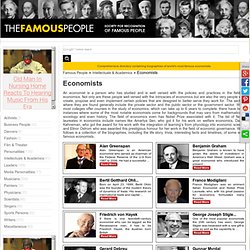
Not only are these people well versed with the intricacies of economics but are also the very people who create, propose and even implement certain policies that are designed to better serve they work for. The sectors where they are found generally include the private sector and the public sector or the government sector. While most colleges offer courses in the study of economics, which can take up to 6 years to complete, there have been instances where some of the most notable economists come for backgrounds that may vary from mathematics to sociology and even history.
The field of economics even has Nobel Prize associated with it. Alan GreenspanAlan Greenspan is an American economist who served as chairman of the Federal Reserve of the U.S from 1987 to 2006. Ronald Coase. Ronald Harry Coase (/ˈkoʊz/; 29 December 1910 – 2 September 2013) was a British economist and author.
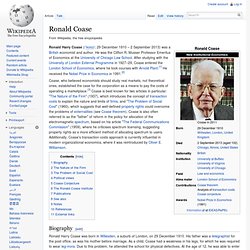
He was the Clifton R. Musser Professor Emeritus of Economics at the University of Chicago Law School. After studying with the University of London External Programme in 1927–29, Coase entered the London School of Economics, where he took courses with Arnold Plant.[1] He received the Nobel Prize in Economics in 1991.[2] Biography[edit] Organizational Economics Definition. Organizational Economics. Portal:Business and economics. NABE - Home. Business. The etymology of "business" stems from the idea of being busy, and implies socially valuable and rewarding work.
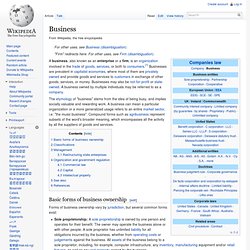
A business can mean a particular organization or a more generalized usage refers to an entire market sector, i.e. "the music business". Compound forms such as agribusiness represent subsets of the word's broader meaning, which encompasses all the activity by all the suppliers of goods and services. Kansas Strong. Chevron Energy Generator. Soft Drink Industry Structure. The illusion of diversity: visualizing ownership in the soft drink industryPhil Howard,1 Chris Duvall2 and Kirk Goldsberry3August, 2010 BackgroundThree firms control 89% of US soft drink sales [1].
This dominance is obscured from us by the appearance of numerous choices on retailer shelves. Steve Hannaford refers to this as "pseudovariety," or the illusion of diversity, concealing a lack of real choice [2]. To visualize the extent of pseudovariety in this industry we developed a cluster diagram to represent the number of soft drink brands and varieties found in the refrigerator cases of 94 Michigan retailers, along with their ownership and/or licensing connections.
Click for zoom.it (scroll in and out) version or extra large versionPDF version of Soft Drink Industry Structure, 2008. Capitalism. The degree of competition, role of intervention and regulation, and scope of state ownership varies across different models of capitalism.[5] Economists, political economists, and historians have taken different perspectives in their analysis of capitalism and recognized various forms of it in practice.
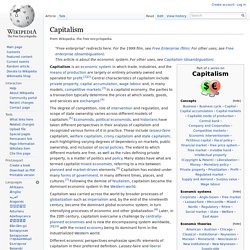
These include laissez-faire capitalism, welfare capitalism, crony capitalism and state capitalism; each highlighting varying degrees of dependency on markets, public ownership, and inclusion of social policies. The extent to which different markets are free, as well as the rules defining private property, is a matter of politics and policy. Many states have what are termed capitalist mixed economies, referring to a mix between planned and market-driven elements.[6] Capitalism has existed under many forms of government, in many different times, places, and cultures.[7] Following the demise of feudalism, capitalism became the dominant economic system in the Western world.
Enough Is Enough. 2012 update - final.doc. : freegan.info. Environmental economics. Environmental economics is a sub-field of economics concerned with environmental issues.
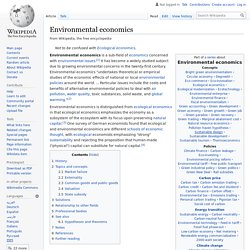
It has become a widely studied topic due to growing environmental concerns in the twenty-first century. Environmental Economics "...undertakes theoretical or empirical studies of the economic effects of national or local environmental policies around the world ... . Particular issues include the costs and benefits of alternative environmental policies to deal with air pollution, water quality, toxic substances, solid waste, and global warming. "[1] PROUT Globe presents the Progressive Utilisation Theory. Participatory economics. Albert and Hahnel stress that parecon is only meant to address an alternative economic theory and must be accompanied by equally important alternative visions in the fields of politics, culture and kinship.
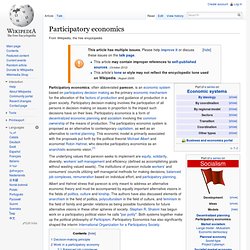
The authors have also discussed elements of anarchism in the field of politics, polyculturalism in the field of culture, and feminism in the field of family and gender relations as being possible foundations for future alternative visions in these other spheres of society. Stephen R. Participatory Economics - A Theoretical Alternative to Capitalism. Participatory Economics: A Theoretical Alternative to Capitalism Review by Geert Dhondt [We seek] a condition of society in which there should be neither rich nor poor, neither master nor master’s man, neither idle nor overworked, neither brain-sick workers, nor heartsick hand workers, in a world, in which all would be living in equality of condition and would manage their affairs unwastefully, and with the full consciousness that harm to one would mean harm to all—the realization at last of the meaning of the word commonwealth. — William Morris(1) Anarchism is a definite intellectual current of social thought, whose adherents advocate the abolition of economic monopolies and of all political and social coercive institutions within society.
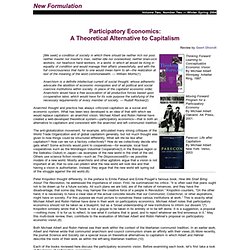
Participatory Economics: An Alternative to Capitalism. Churchill is often misquoted as having said that democracy is the worst form of government except for all the others. A similar sentiment is sometimes expressed about capitalism: 'Socialism was tried in Russia and look what happened there'. It is no longer acceptable to make idealistic utopian claims about how wonderful life would be without capitalism.
Beyond Super-Elites and Conspicuous Consumption: Real Ecological Sustainability in the Twenty-First Century. This "Chapter Eighteen" is part twenty of Truthout's continuing series of excerpts from Gar Alperovitz's "America beyond Capitalism.
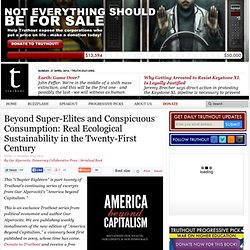
" This is an exclusive Truthout series from political economist and author Gar Alperovitz. We are publishing weekly installments of the new edition of "America Beyond Capitalism," a visionary book first published in 2005, whose time has come. Donate to Truthout and receive a free copy. Pluralist Commonwealth strategies aim to undercut forces that permit unrestrained expansion by building up converging lines of foundational restructuring over time, especially those that reduce key inequality and psychological consumption drivers and develop new community cultural norms.
Although there is dispute about the precise dimensions of the problem, prudence alone suggests the importance of confronting basic ecological limits. Steady state economy. A steady state economy is an economy of relatively stable size.
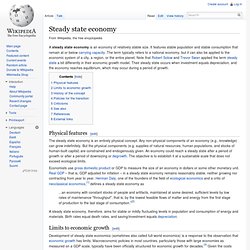
It features stable population and stable consumption that remain at or below carrying capacity. The term typically refers to a national economy, but it can also be applied to the economic system of a city, a region, or the entire planet. Note that Robert Solow and Trevor Swan applied the term steady state a bit differently in their economic growth model. Their steady state occurs when investment equals depreciation, and the economy reaches equilibrium, which may occur during a period of growth. Milton Friedman - Capitalism and Freedom. Capitalism and Freedom, a major work of 20th century economics and political philosophy, opens controversially. Milton Friedman asserts that John F Kennedy’s famous statement in his inaugural address as United States president - “Ask not what your country can do for you – ask what you can do for your country”, was not worthy of the role of an individual in a free society.
Government, he writes, should neither be the patron of an individual, nor should that person consider themselves a servant of the government. In a real democracy, the nation exists only for the will of the people; governments are a means towards an end, and nothing more. Neoliberalism. Invisible hand. In economics, the invisible hand is a metaphor used by Adam Smith to describe unintended social benefits resulting from individual actions.
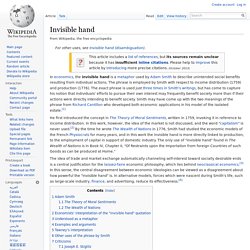
The phrase is employed by Smith with respect to income distribution (1759) and production (1776). The exact phrase is used just three times in Smith's writings, but has come to capture his notion that individuals' efforts to pursue their own interest may frequently benefit society more than if their actions were directly intending to benefit society. Laissez-faire. Etymology and usage[edit] Legend has it that the term laissaez faire originated in a meeting that took place around 1681 between powerful French Comptroller-General of Finances Jean-Baptiste Colbert and a group of French businessmen headed by a certain M.
Le Gendre. When the eager mercantilist minister asked how the French state could be of service to the merchants and help promote their commerce, Le Gendre replied simply "Laissez-nous faire" ("Leave it to us" or "Let us do ["it," the French verb not having to take an object]").[2] The anecdote on the Colbert–Le Gendre meeting appeared in a 1751 article in the Journal économique, written by French minister and champion of free trade René de Voyer, Marquis d'Argenson—also the first known appearance of the term in print.[3] Argenson himself had used the phrase earlier (1736) in his own diaries, in a famous outburst: Laissez faire, telle devrait être la devise de toute puissance publique, depuis que le monde est civilisé ... Laissez-faire capitalism is the political economic system based on individual rights.
Markets and Morals. Share The World’s Resources - STWR. Exponential Economist Meets Finite Physicist. [slimstat f='count' w='ip' lf='resource contains economist'] views this month; [slimstat f='count' w='ip' lf='strtotime equals 2011-07-01|interval equals -1'] overall Some while back, I found myself sitting next to an accomplished economics professor at a dinner event. Shortly after pleasantries, I said to him, “economic growth cannot continue indefinitely,” just to see where things would go. It was a lively and informative conversation. I was somewhat alarmed by the disconnect between economic theory and physical constraints—not for the first time, but here it was up-close and personal. Though my memory is not keen enough to recount our conversation verbatim, I thought I would at least try to capture the key points and convey the essence of the tennis match—with some entertainment value thrown in.
Resource Based Economy. Zero growth - population and sustainable economics. Remix culture. Remix culture, sometimes read-write culture, is a society that allows and encourages derivative works by combining or editing existing materials to produce a new creative work or product.[2][3] A remix culture would be, by default, permissive of efforts to improve upon, change, integrate, or otherwise remix the work of copyright holders. Open-source economics. First applied to the open-source software industry,[1] this economic model may be applied to a wide range of enterprises.
TEDxSydney - Rachel Botsman - Collaborative Consumption Author Presents Compelling Case for 21C. Crowdsourcing. Who's Counting? Marilyn Waring on Sex, Lies and Global Economics by Terre Nash. System of National Accounts. Leading Canada's transition to a clean energy future. The Stages of Economic Growth: A Non-Communist Manifesto: W. W. Rostow: 9780521409285: Amazon.com. FedStats.
Standing Up To Powerful Interests. The 147 Companies That Control Everything. The wages of men and women: should they be equal?: Beatrice Webb: Amazon.com. Socioeconomics. Socioeconomics (also known as socio-economics or social economics) is the social science that studies how economic activity affects and is shaped by social processes. In general it analyzes how societies progress, stagnate, or regress because of their local or regional economy, or the global economy. Overview[edit] Socioeconomics is sometimes used as an umbrella term with different usages.
Unfit for Work: The startling rise of disability in America. Are There Too Many Ph.D.s And Not Enough Jobs? Our country needs more people with science, math and engineering degrees — at least, that's the common refrain among politicians and educators. American students lag behind the rest of the world when it comes to math and science test scores, and the president and others have called for a change in immigration laws that would make it easier for people who come to the U.S. to get technical degrees to stay in the country permanently. Socialist Workers Party (United States) The Socialist Workers Party is a far-left political organization in the United States. Fair Labor Association. 1107.5728v2.pdf (application/pdf Object)
Economics. The World Economy.